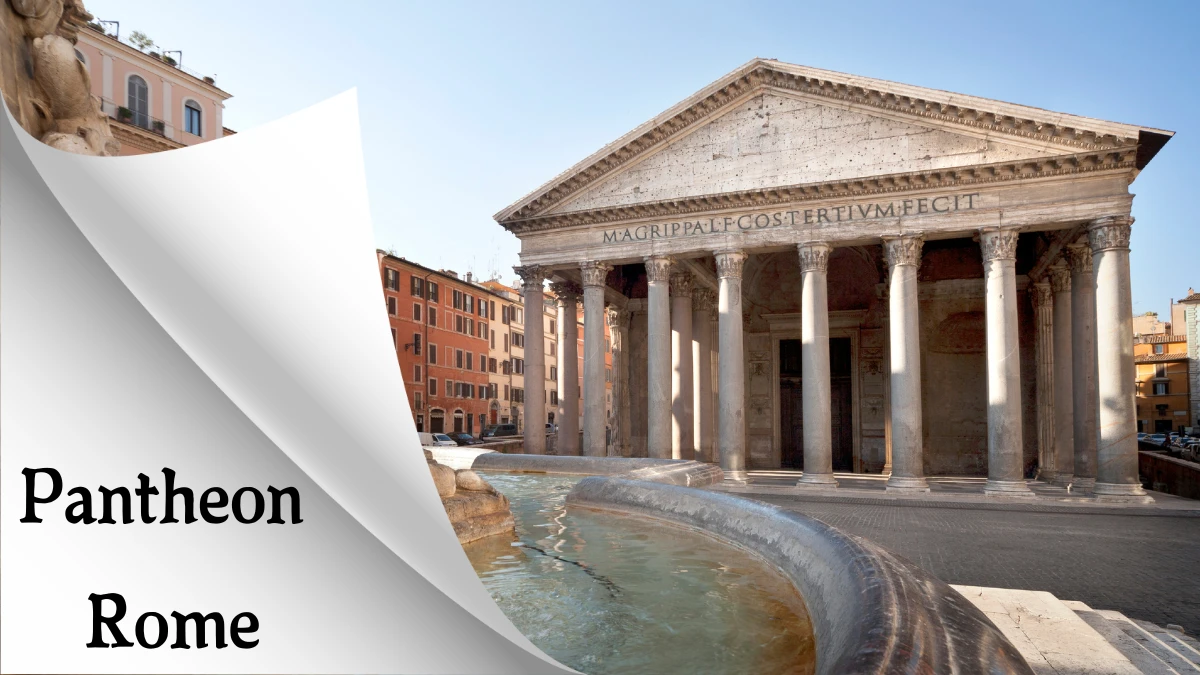Rome Attractions
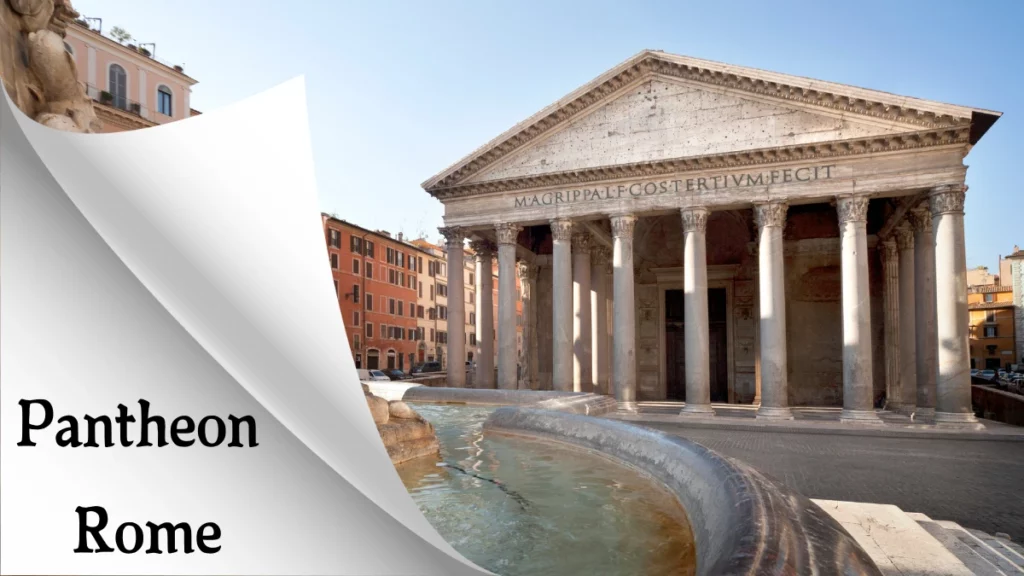
The Pantheon in Rome is nearly 2000 years old, and it remains the oldest building still in use today.
Derived from the Greek words ‘Pan’ (all) and ‘Theos’ (God), the Pantheon reflects its original purpose to honor all gods.
This landmark in Rome is famous for its awe-inspiring architecture, especially the massive unreinforced concrete dome and its oculus, an open skylight at the dome’s center.
A must-visit for anyone exploring Rome’s rich past—it attracts over 7 million visitors yearly, here’s everything you need to know before buying your Pantheon Rome tickets.
Top Tickets
# Pantheon Audio Guide Tour
# Guided tour of Pantheon
# Private tour of Pantheon
What’s ahead
Things to know before booking tickets
You can book your Pantheon Rome tickets online or at the venue, but buying them at the attraction may involve long wait times, especially during peak hours. Online tickets help you skip the queue, are often cheaper, and allow you to choose a preferred time slot in advance. Booking online also ensures availability and prevents last-minute sell-outs. After the purchase, the tickets are emailed to you, and you can enter by showing the e-ticket on your smartphone—no printouts needed!
Tickets for Pantheon Rome
It was only at the beginning of 2018 that the Italian Culture Minister announced entry tickets for Pantheon Rome. Entry was free before this.
The minister cited the need to cover the high costs of running the historic building in the center of Rome and proposed a €2 per person entrance fee for the Pantheon.
The good news is that entry tickets are yet to be implemented, and visitors can enter the monument for free.
You can either opt for an audio guide tour, which helps you understand the significance of the 2000-year-old monument, or choose the more memorable guided tour of the Pantheon.
There are many scamsters who hang around in front of the monument, selling tickets. Avoid falling for their tricks. Buy your tickets online and in advance for the best experience possible.
Pantheon Audio Guide Tour
Pantheon Rome’s 35 to 60-minute audio guide tour helps visitors unravel the obscure history of the monument.
The audio guide discusses the revered temple and mausoleum and its fascinating architectural features, such as the oculus and dome.
The tour also offers 15 listening points and a map to locate points of interest inside the Basilica.
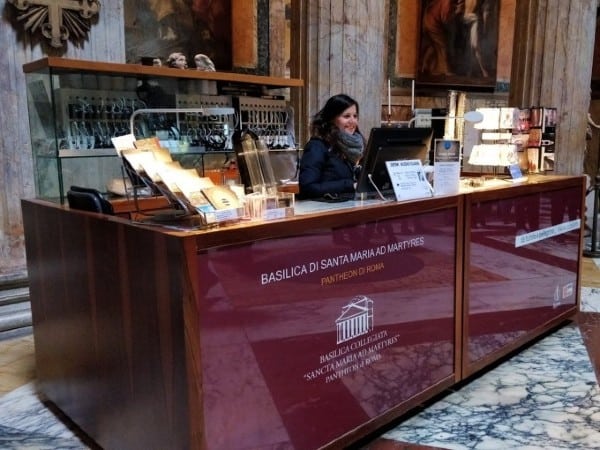
Visitors can collect their audio guide at the desk inside the Pantheon after showing their audio guide voucher and an ID with a photograph.
Image: Pantheonroma.com
Bringing your wired earphones with a jack for Android devices (no Bluetooth, wireless, or iPhone) is even better. You can buy them at the audio guide help desk for €1 a piece.
The audio guide is available in 12 languages such as Chinese, English, French, German, Italian, Portuguese, Russian, Spanish, Polish, Dutch, Arabic, and Korean.
Ticket prices
Adult (18+ years): €15
Child (up to 17 years): €10
EU Citizens (with a valid ID): €13
Recommended Attractions
Guided tour of Pantheon
For the most memorable experience, we recommend a guided tour of the Pantheon.
A local expert takes you on a 45-minute tour of the monument and shares stories about the history, architecture, and personalities involved.
Prepare to be awestruck by the sheer magnificence of the Pantheon’s architecture. The grand entrance, towering Corinthian columns, leads to the massive bronze doors that open into the building.
Once inside, you will encounter the iconic dome, a masterpiece of ancient engineering.
The dome’s design and the open oculus at the top allow natural light to flood the interior, creating a breathtaking play of light and shadow that changes throughout the day.
Plaques and inscriptions inside the Pantheon highlight its history, including its construction by Emperor Hadrian and its transformation into a Christian church.
Ticket Prices
Adult (18+ years): €31
Child (up to 17 years): €19
EU Citizens (with a valid ID): €26
Frequently asked questions
Here are some questions tourists frequently ask before purchasing their tickets for the Rome Pantheon.
Does the Pompeii offer free tickets?
Rome residents, visitors with disabilities, and children aged five years and younger can enter the attraction for free. Access is free for all on the first Sunday of every month.
Can I buy tickets at the venue?
Yes, tickets are available at the venue’s ticket office. However, due to the high demand, there are long queues, and popular timeslots may sell out quickly.
Do we need to print online tickets?
Visitors can present their tickets on mobile devices, but printed tickets are also accepted at the Rome Pantheon. You can show the voucher on your mobile to the staff at the attraction’s entrance.
What is the arrival time?
When you book the Pantheon’s tickets, you must select a preferred time of visit. Keep the security check time in mind and arrive at least 10 minutes ahead of your visit time.
What is the monument’s late arrival policy?
Entry to Pantheon is not guaranteed if you miss your time slot.
Does the Pantheon in Rome offer discounts for locals?
The attraction offers discounted admission to EU citizens aged between 18 and 25 years, as well as children aged between six and 17 years.
Does Roma Pass include access to the Pantheon?
Yes, the Roma Pass offers you access to the Pantheon and one more museum or archaeological site of your choice.
What is the Pantheon’s refund policy?
This attraction of Rome has a flexible cancellation policy. You can cancel your ticket up to 24 hours before your visit for a full refund.
Are there any restrictions on what items I can bring inside the Pantheon?
Large bags, backpacks, and umbrellas are prohibited inside the Pantheon. Hence, it’s advisable to carry minimal belongings during your visit.
Is there wheelchair access to the monument?
Yes, the attraction is wheelchair accessible, with ramps providing access to the entrance. However, due to the historic nature of the building, there might be some limitations in certain areas.
Can I attend religious services at the monument?
The Pantheon is an active church (Santa Maria ad Martyres). Visitors are welcome to attend religious services, but it’s important to be respectful if a service is ongoing during your visit.
Pantheon Rome hours
The Pantheon Basilica in Rome is open daily from 9 am to 7 pm. The last entry is 30 minutes before the closing time of the Pantheon.
It is also a working church (Basilica of Sancta Maria ad Martyres), and holy mass services are conducted regularly.
Mass is at 10.30 am on Sundays and public holidays and 5 pm on Saturdays and pre-holidays.
The monument remains closed on 1 January, 15 August, and 25 December.
The best time to visit
The best time to visit the Pantheon is between 9 am and 11 am when the crowd hasn’t started trickling in yet. Large tour groups start streaming around 11 am and continue till 4 pm.
If you can’t make it in the morning, 4 pm and 6 pm are the next best slots. However, you should know that after the sun goes down, you won’t see the light entering the oculus and its reverse sundial effect.
The attraction is busier on weekends than it is on weekdays.
How long does the tour take
Most visitors spend around 30 minutes exploring the Pantheon in Rome.
The duration of Pantheon’s audio guide, which you can book in advance, is 35 minutes.
Since the Pantheon doesn’t take much time, some tourists club it with other nearby attractions.
These include Piazza Navona (300 meters away), Trevi Fountain (700 meters away), and the Spanish Steps which are a little more than a kilometer away.
What’s inside Pantheon Rome
The Pantheon in Rome follows the rules of Classical architecture laid out by Vitruvius, a military engineer and architect for Julius Caesar.
The building is 43.2 meters (142 feet) tall and has the same width, giving it the impression of balance and harmony.
Made of bricks and concrete, the Roman Pantheon consists of three parts—a portico with granite columns, a massive dome, and a rectangular area connecting the two.
Pantheon’s Portico
During your visit, the first feature you spot is the beautiful front portico supported by sixteen columns.
The shafts (cylindrical part of the column) are carved out of premium Egyptian granite shipped from Egypt over the Mediterranean Sea.
The capitals (decorative top of the column) and bases were carved from white Greek marble.
These Corinthian columns supporting the portico weigh 60 tons each, are 11.8 meters (39 feet) tall, and 1.5 meters (five feet) wide.
Inscription at the entrance
The current Pantheon is the third building at the same site.
Marcus Agrippa built the first version in 27 BC, and after it burned down, Emperor Domitian rebuilt it.
Unfortunately, the second building was struck by lightning and subsequently destroyed.
King Hadrian built the current monument between 118 and 128 AD, and it’s still intact even after 2000 years!
He reused the original inscription—“Marcus Agrippa, the son of Lucius, three times consul, made this”— for unknown reasons and attributed the building to Agrippa.
Don’t forget to read the inscription before you step inside the Pantheon.
Pantheon’s Oculus
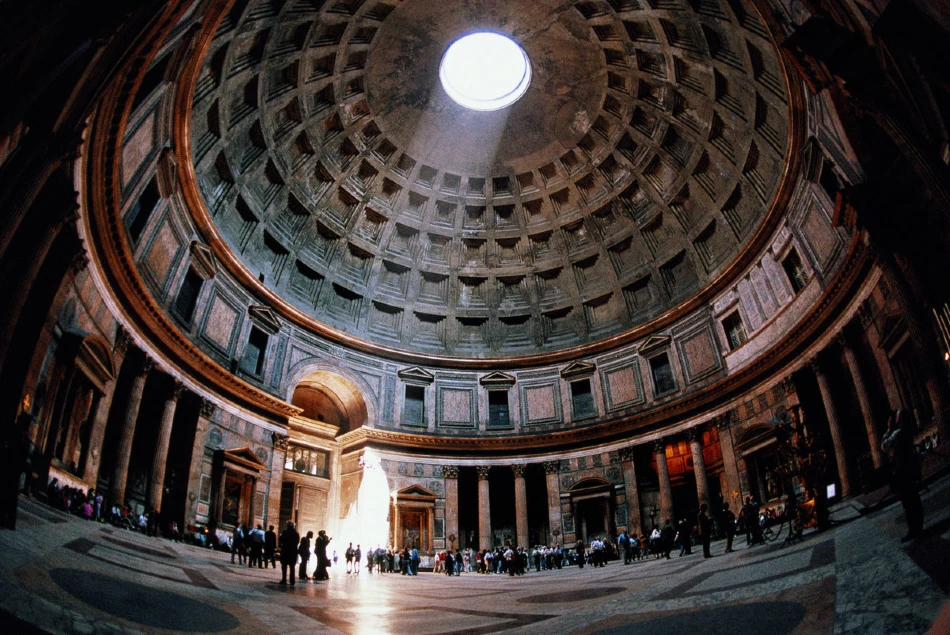
The Pantheon has a hole in its dome that measures 8.2 meters (27 feet) in diameter.
The oculus in the dome’s center is also known as ‘The Eye of the Pantheon.’ Back in the day, it was the only light source when the monument was built.
Since it is open to the elements, rain enters the building from the massive hole.
However, a gently sloping floor and 22 well-hidden drainage holes ensure no waterlogging.
Pantheon’s Dome
The Pantheon’s dome, which measures 43.2 meters in diameter, held the record for the largest dome in the world for over 1300 years.
Its record was beaten when Filippo Brunelleschi got inspired by the Pantheon and engineered the dome of Florence Cathedral.
However, it is still the largest unreinforced concrete dome in the world.
The dome was initially covered in bronze, but it was stripped away with time.
Tombs inside Pantheon
Inside the Pantheon, visitors can also see the tombs of many famous Italians.
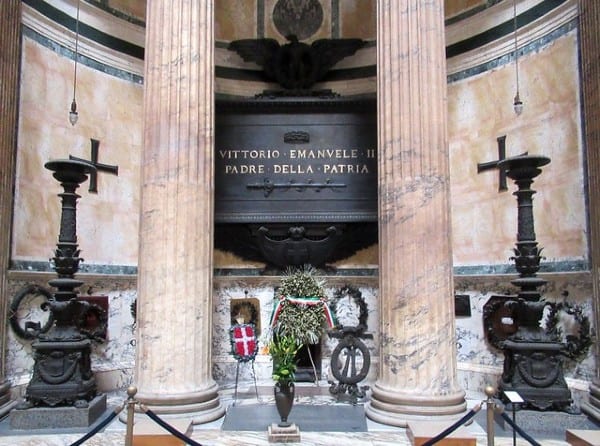
It is the final resting place of Vittorio Emanuele II (in pic) and his son Umberto I, the first two kings of unified Italy.
Visitors can also see the tombs of painter Raphael, composer Arcangelo Corelli, architect Baldassare Peruzzi, etc.
Image: Walksinrome.com
Pantheon dress code
The Pantheon is still a working church – its name is Santa Maria e Martiri (St Mary and all the Martyrs).
As with all religious places in Italy, visitors should dress appropriately to enter the ancient building.
Men should wear trousers or jeans, and women should wear pants and skirts and also ensure their legs covered.
You must also cover your shoulders, so a T-shirt or a wrap-around is usually fine.
It is better not to wear flip-flops and be quiet during your visit.
